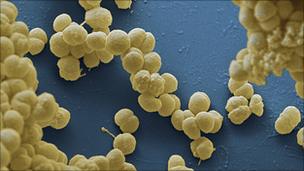Doctors offered meningitis 'red flag' advice
- Published

Bacteria are one of the causes of meningitis
Doctors should check for leg pain, confusion, stiff neck and sensitivity to light in children as the "red flags" for meningitis, a study says.
Headaches, pale colour and cold hands and feet are not reliable early signs of the disease, says the report in the .
The classic meningitis rash appears later during an infection, researchers said after following 1,200 cases.
Charities said parents should still keep an eye out for .
Approximately one in 10 patients infected with the condition will die.
Meningitis is an inflammation of the membranes which cover the brain and spinal cord and can be caused by a viral or bacterial infection.
The researchers said half of children with the condition were initially misdiagnosed, perhaps because symptoms such as the classic rash, appear later in the infection.
The study looked at symptoms at the early stages of the disease by following 1,212 cases at 15 GP surgeries in Oxfordshire and Somerset.
The authors said: "Only confusion, leg pain, photophobia, rash and neck pain/stiffness can be considered 'red flags' for this illness."
They said headache and a pale colour were less common in children with meningococcal disease than in those with minor infections.
'Hung up on rash'
Sue Davie, chief executive of the Meningitis Trust, said: "Anything that helps early diagnosis is a good thing."
However, she said this was advice for GPs and warned against parents ignoring other symptoms: "I'm always cautious about homing in on one or two symptoms as parents need to be vigilant against them all.
"Everyone gets hung up on the rash, a third of people said they wouldn't take action without a rash and that can be deadly."
Chris Head, chief executive of the Meningitis Research Foundation, said: "This is a significant move forward to enable early recognition of these diseases. Not everyone with meningitis and septicaemia gets all the symptoms.
"Children with septicaemia may not have a stiff neck or dislike of bright lights. Children with meningitis may not get a rash.
"That's why it's important for parents to trust their instincts and not be deterred from seeking medical help again if their child gets worse after being seen by a doctor."
- Published8 August 2010